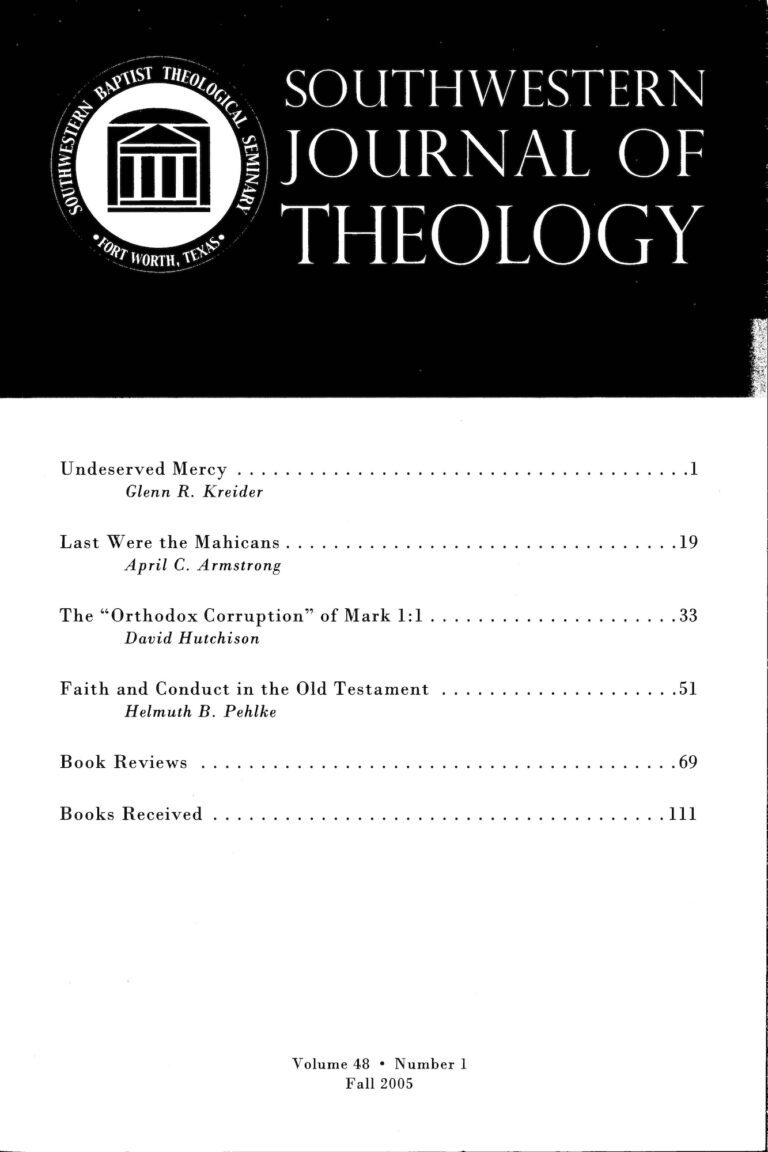
Southwestern Journal of Theology (48.1)
Southwestern Journal of Theology
Volume 48, No. 1 - Fall 2005
Editor: Paige Patterson
Old Testament Turning Points: The Narratives That Shaped A Nation. By Victor H. Matthews. Grand Rapids: Baker Academic, 2005. 204 pages. Softcover, $18.99.
This present work attempts to track the key turning points in the history of Israel and the recurrent themes that grow from them. Victor Matthews highlights eight key points in the history of Israel that help to form the foundation for their story. Understanding that this is not precisely a hook on Old Testament themes, but rather an examination of moments in time that changed the course of a nation somewhat helps to explain the noteworthy absence of the impact of prophecy on the nation. However, since the title suggests that the book examines narratives that shaped a nation, the inclusion of the concept of redemption (messianic hope) would strengthen the work.
On a positive note, Matthews does a good job with the historical background of the narratives. Also, within each chapter, Matthews highlights a number of motifs that grow out of the main narrative being addressed. These motifs, Matthews suggests, are the means by which the story is imparted. Matthews does a good job of providing supplementary material to substantiate the chapters. Charts are frequent and generally helpful for the reader. Additionally, Matthews works hard to portray Israel in its cultural and geographical context, which is admirable. At times however, the connections to the Ancient Near East seem stretched. The works cited section, while extensive, fails to interact with some of the more noteworthy authors within the field. Instead, by far the most often cited author in the notes is Matthews himself. He cites his own works more than twenty times in the book.
Matthews tends to minimize the role of God’s providence in the text and history of Israel. For example, the author does not interpret the serpent in Genesis 3 as Satan, but simply “another of the animals that populate the garden,” who simply gives Eve the opportunity to investigate her own “intellectual curiosity.” Similarly, he views the response of Adam and Eve to the question raised by the serpent not as sin, but simply a “rite of passage from childhood to adulthood.” Thus, he concludes that the response of the man and woman has actually prepared them for “life outside Eden, where clothing is a mark of status, gender, and economic conditions.” Moreover, the author concludes that Eden was an improper and “unsuitable place” for Adam and Eve and had they “never been expelled from Eden, then the effort that is the basis for most human achievement as well as good and bad actions, would not exist.” In other words, their sin was beneficial to both them and mankind. Finally, Matthews is subtly critical of the God-ordained roles of Adam and Eve. He claims that “peace and contentment can be found in … a personal effort to rise above the need for dominance over others, either politically, economically, or sexually.” In a similar manner, Matthews minimizes the role of divine sovereignty in his explanations of the transitions of authority from Saul to David and David to Solomon, the role of the Ark of the Covenant, and the reforms of Ezra and Nehemiah in favor of more anthropocentric explanations.
Matthews’s moderate view on the authorship of the books appears in nearly every chapter, arguing for multiple authorship of the Pentateuch, Kings, and Chronicles and questioning the traditional view of authorship on other passages. More egregiously, at times, the author even questions the accuracy of the text. He accuses the authors of the text of being inaccurate (63, 76, 84, 105), agenda-driven (84), biased (111), and not reporting the events accurately (139).
Overall, the book is at times both interesting and frustrating to read. As far as tracking the events that changed the course of history for God’s people, Matthews does an adequate job. However, what’s missing is the acknowledgement of the sovereign, guiding hand of God throughout Israel’s history. That one truth assures readers today that God’s people were not just stumbling throughout the Middle East looking for a home, but in fact were supernaturally led by a loving God who is guiding them to an ultimate hope in Christ.





